Raids lift the lid on bureau de change for criminals
- Published
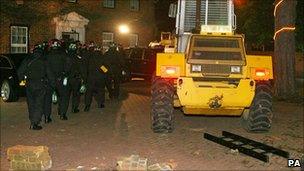
Police used a digger to break through a wall during a raid on one of the ringleaders
After a massive police operation which uncovered a spider's web of links between gangsters, 33 people have been convicted in connection with drug dealing or money laundering. The case has highlighted what police describe as a "weak point" - the use of legitimate bureaux de change by money launderers.
Hidden beneath a motorway close to London's Paddington station is a nondescript building - the former hub of a criminal business that allowed crime bosses to exchange "dirty" drug money for untainted currency.
Royal Oak Taxis was the front business, outwardly a legitimate firm that rented and repaired black cabs.
But behind the scenes lurked a far more lucrative business - a massive money laundering operation for organised crime networks from all over the country.
The full details behind Operation Eaglewood can now be revealed after reporting restrictions were finally lifted, following 16 trials and the conviction of 33 people.
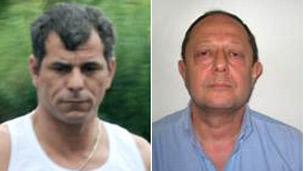
Eyad Iktilat (left) laundered the drugs money through Jean-Claude Frigieri
The man at the centre of the Royal Oak Taxis network was a 47-year-old middleman, Eyad Iktilat, an Israeli Arab playboy who drove a Ferrari and a Bentley with personalised numberplates.
Shortly before his arrest Iktilat had purchased a piece of land in Spain for £750,000 and was planning to spend another £2m on building a luxury villa.
At the trial at Woolwich Crown Court, evidence revealed Iktilat and his gang helped launder around £80m over a two-year period - money from drug dealers based across the Midlands and south east of England.
Among their customers was Simon Ford, a hero of the 7 July 2005 bomb attacks.
Ford, a former firefighter, had been commended by the Commissioner of the Metropolitan Police for his actions in Tavistock Square, where a bus exploded.
But Ford later suffered personal problems and became a cocaine user. He was caught red-handed with 110 kilos of cocaine which had just been landed on a beach in Kent and was jailed for 14 years.
Other Iktilat clients included drug dealers Robert Gregory from Essex, Jason Topsom from Hertfordshire and Russell Tate from Cambridgeshire.
Tate's brother, Pat, was one of three drug dealers murdered in a Range Rover in Rettendon, Essex, in December 1995.
Dirty money
Iktilat received large bags of dirty money from the dealers and then handed them over to Jean-Claude Frigieri, the Egyptian-born owner of a high street bureau de change in Bayswater, west London.
Frigieri, from West Molesey in Surrey, changed the money for 500 euro notes which he bought in bulk from currency wholesalers Interchange, who, evidence revealed, were oblivious to his role.
The 500 euro note - now withdrawn from sale in the UK partly as a result of Operation Eaglewood - had been notoriously popular with criminals because it allowed them to conveniently convert large amounts of money.
For example, £1m in 500 euro notes weighs 2kg, compared with 50kg in £20 notes.
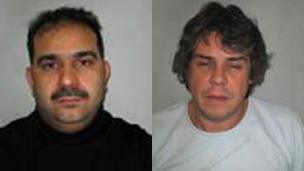
Maythem al-Ansari (left) was jailed for three years while Stuart Wright got 10 years
The legitimate turnover of Frigieri's firm was no more than £20,000 a day. However, he was buying up to 450,000 euros at a time from Interchange and exchanging it for Iktilat.
In April 2007 Scotland Yard launched a surveillance operation. They bugged Royal Oak Taxis and kept a close watch on Iktilat and his gang.
Raids
Over the months, Operation Eaglewood detectives amassed a wealth of evidence and by 13 February 2008 they were ready to move in.
In simultaneous early morning raids around 500 police officers arrested 22 people in properties in London, Surrey, Essex, Kent and Hertfordshire.
In one instance, a digger was used to smash through the perimeter wall of a house in Hillingdon, west London, belonging to Maythem al-Ansari - a "criminal investor" who posed as a legitimate businessman while financing drug smuggling and other illegal enterprises.
It was Iraqi-born al-Ansari who had stepped into the role of money launderer when a frightened Frigieri pulled out.
Wednesday's court case brings to an end a legal saga which saw 33 people sentenced to more than 200 years in jail.
Frozen assets
Police froze a number of assets in the UK but say the gang invested in land and property in Israel, India and Dubai.
Detective are also keen to speak to Nicholas Tayler, who is suspected of money laundering, and Carlos Tabares, who is suspected of drug trafficking. Both are believed to be on the run somewhere in Europe.
The case has also led to questions over whether more needs to be done to regulate the foreign exchange industry.
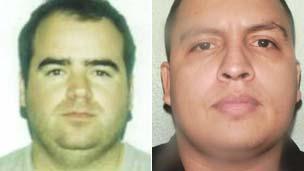
Nicholas Tayler (left) and Carlos Tabares are believed to be on the run
Detective Superintendent Steve Richardson, who led Eaglewood, said: "Interchange had the correct systems in place but it's widely known that bureaux de change are a weak point when it comes to money laundering."
Dominic Thorncroft, chairman of the UK money transmitters' association (UKMTA), contacted HM Revenue & Customs to highlight the implications of the Frigieri case.
Under money laundering regulations bureaux de change are supposed to monitor transactions and report their suspicions to the Serious and Organised Crime Agency (Soca).
Laws too lax?
But Mr Thorncroft told the BBC: "The money laundering regulations are not as precise as they should be. We highlighted this case to HMRC a year ago but they have not changed or amended their guidance at all."
He said: "We think you should be able to document every penny, regardless of your status. There should be some obligation to understand what the money relates to."
Frigieri's was one of 4,000 firms which hold a Money Service Business (MSB) registration - handed out by HMRC - which allow them to trade in foreign currency.
Mr Thorncroft said: "Frigieri was going to wholesalers and saying 'I'm an MSB' and they were using that as due diligence."
He said: "There is a fit and proper test to be able to register as an MSB but it's still quite easy to obtain."
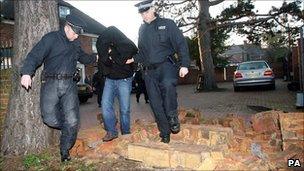
Maythem al-Ansari, seen here under arrest, made money by invested in criminal enterprises
Mr Thorncroft said: "I can understand that the government doesn't want to bring in kneejerk legislation because of one case because at the moment there is no evidence that [money laundering] is systemic."
An HMRC spokesman said: "HMRC reviewed its guidance but came to the conclusion that the existing material adequately explained the roles and responsibilities of businesses involved in these types of transaction.
"Intermediaries are currently required by the regulations to report suspicious activity to Soca.
"Adding additional burdens on intermediary businesses are therefore not necessary as the law and HMRC guidance is already clear on what they are required to do.
"In addition, if an individual has been convicted of a money laundering offence they cannot operate an MSB and would not pass HMRC's Fit and Proper test. "
- Published5 January 2011
- Published5 January 2011